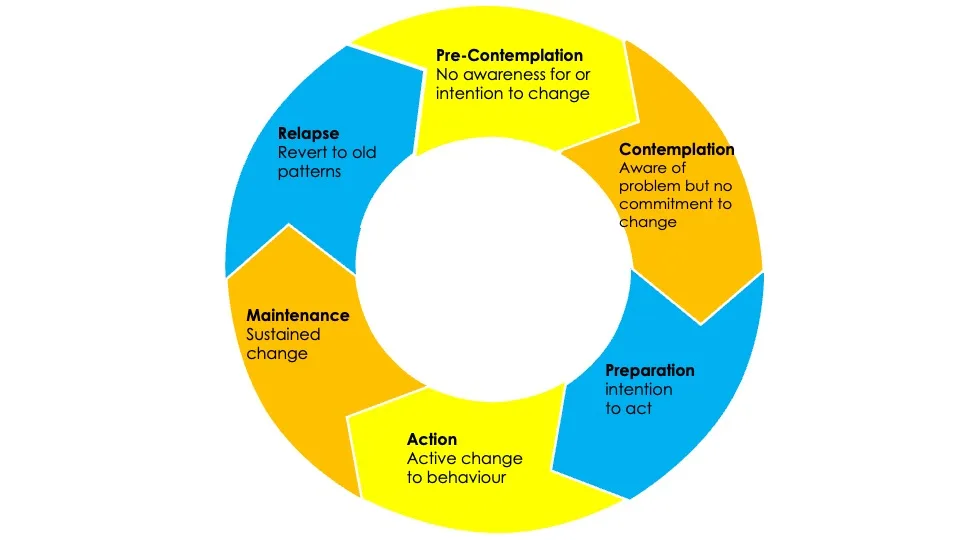
Why is Change Management Training Important
Change management in any organisation is a huge undertaking. In most cases, about 80% of the people (these are mostly passive personalities, see DISC personality profile) required to change did not make the decision to adopt the change, and are only informed when the change is imminent.
I’m sure you will find this story somewhat familiar: My uncle was a heavy smoker since his teenage years. He tried quitting a few times but was never successful.
5 years ago, he lost 2 of his close friends to lung cancer and shortly after, he made up his mind to quit smoking. He has been smoke free since then.
Change management training is important because change is a constant in today’s world. People need to understand that in order to implement change, everyone involved must be convinced that the change is important or they will not be able to take the necessary actions for change, or they may do it half-heartedly.
Change management training can help organizations to understand the mental and physical steps that are required in order for change to be successfully implemented.
Prochaska and DiClemente’s Stages of Change Model

One of the most well-known models of change is the Stages of Change Model (also known as the Transtheoretical Model), developed by psychologists James Prochaska and Carlo DiClemente. The model describes six stages of change:
- Precontemplation: At this stage, the individual is not aware of the need to change or is not interested in changing. People can be in this stage for weeks, months or even years, like my uncle mentioned earlier.
If the staff in an organisation do not see that the change is important or needed, it is hard for them to go from the precontemplation stage to even the contemplation stage, let alone take action to adopt the change. - Contemplation: At this stage, the individual is aware of the need to change and is considering doing so. They could be in this stage for weeks or months.
- Preparation: At this stage, the individual is making plans to change. The planning stage could last for days or weeks.
- Action: At this stage, the individual is making changes to their behavior. This change has to be sustained for 3 to 6 months.
- Maintenance: At this stage, the individual is maintaining the changes they have made, they do not feel tempted to go back to the old ways of do things. Generally this happens after 6 months of sustained change.
- Relapse: At this stage, the individual slips into his old behaviour, this could happen during action or maintenance phase. Understanding this phase is common is important because it is during a relapse that people revert back to the old ways and give up changing.
Where It Has Been Applied
Prochaska and DiClemente’s Stages of Change model was initially meant for smoking cessation but it has been applied widely, and has shown success in helping individuals change their behaviour in the following areas:

- Smoking cessation
- Weight loss
- Exercise promotion
- Alcohol reduction
- Drug abuse prevention
- Family Violence
- Dietary change
- Physical activity promotion
- Chronic disease management
- Oral health promotion
- HIV prevention
- Cancer screening
- Sun protection
- Workplace safety
How Prochaska and DiClemente’s Research Can Help with Change Management
Prochaska and DiClemente’s research can help with change management by providing insights into how people change and how to support them through the change process. For example, the Stages of Change Model can be used to identify where individuals and organizations are in the change process and to develop interventions that are tailored to their specific needs.
Here are some examples of how Prochaska and DiClemente’s research can be used to support change management:
- Precontemplation: At this stage, the individual or organization may need to be educated about the need for change and the benefits of change.
- Contemplation: At this stage, the individual or organization may need to be helped to weigh the pros and cons of change and to develop a plan for change.
- Preparation: At this stage, the individual or organization may need help to develop the skills and resources they need to implement change.
- Action: At this stage, the individual or organization may need support and encouragement to stay on track with their change plan.
- Maintenance: At this stage, the individual or organization may need help to prevent relapse and to sustain their change over time.
Conclusion
Change management training is a valuable tool that can help individuals and organizations to successfully implement and manage change. Prochaska and DiClemente’s research can help change management practitioners to better understand how people change and how to support them through the change process.
By understanding the Stages of Change Model and how to apply it to change management, organizations can develop more effective change management strategies and increase the likelihood of successful change.
Find out more about how we can assist you with your Change Management Training.
Some of our other popular training topics include DISC personality profile, presentation skills (stage & online), effective communication skills, sales methodology & related training, professional image & digital marketing.
Sources
- yu.edu – Prochaska and DiClemente’s Stages of Change Model for Social Workers
- geekymedics.com – Stages of Change Model
- bu.edu – The Transtheoretical Model
- springer.com – Stages-of-Change Model
- tnchildren.org – Prochaska & DiClemente’s Six Stages of Change
- socialworktech.com – The Stages of Change (Prochaska & DiClemente)